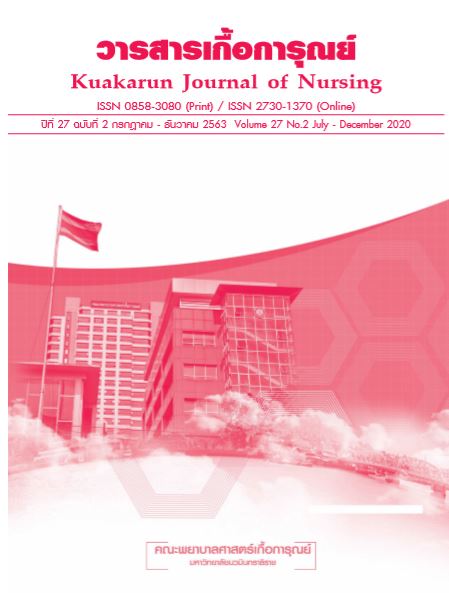การประเมินหลักสูตรการพยาบาลเฉพาะทางด้านการพยาบาลผู้ป่วยแบบประคับประคอง ของคณะพยาบาลศาสตร์เกื้อการุณย์ มหาวิทยาลัยนวมินทราธิราช
คำสำคัญ:
การประเมินหลักสูตร, การดูแลแบบประคับประคองบทคัดย่อ
การวิจัยเชิงพรรณนานี้มีจุดประสงค์ เพื่อประเมินหลักสูตรการพยาบาลเฉพาะทางด้านการพยาบาลผู้ป่วยแบบประคับประคอง ของคณะพยาบาลศาสตร์เกื้อการุณย์ มหาวิทยาลัยนวมินทราธิราช ตามรูปแบบของโดนัลด์ แอล เคิร์กแพทริค ประเมิน 4 ลักษณะ คือ 1) ปฏิกิริยาตอบสนองโดยการประเมินหลักสูตร 2) ผลการเรียนรู้โดยประเมินความรู้และเจตคติ 3) พฤติกรรมที่เปลี่ยนไปหลังการอบรมโดยประเมินสมรรถนะการดูแลแบบประคับประคอง และ 4) ผลลัพธ์ที่เกิดขึ้นต่อหน่วยงานจากความพึงพอใจของญาติ และผลลัพธ์การดำเนินงานตามระบบบริการพยาบาลแบบประคับประคอง กลุ่มตัวอย่างถูกเลือกแบบเจาะจง แบ่งเป็น 4 กลุ่ม คือ 1) ผู้สำเร็จการอบรม 30 ราย 2) หัวหน้างานของผู้สำเร็จการอบรม 30 ราย 3) เพื่อนร่วมงานที่ปฏิบัติงานร่วมกับผู้สำเร็จการอบรม 30 ราย และ 4) กลุ่มญาติของผู้ป่วยที่อยู่ในความดูแลของผู้สำเร็จการอบรม 30 ราย เครื่องมือที่ใช้ในการวิจัยเป็นแบบสอบถาม ได้แก่ แบบสอบถามการประเมินหลักสูตร แบบสอบถามเจตคติต่อการเรียน แบบสอบถามสมรรถนะการพยาบาลประคับประคอง แบบสอบถามความพึงพอใจของญาติผู้ป่วย แบบสอบถามผลลัพธ์การดำเนินงานพยาบาลประคับประคอง และแบบสัมภาษณ์กึ่งโครงสร้าง ผ่านการตรวจสอบความตรงของเนื้อหาจากผู้ทรงคุณวุฒิ 3 ท่าน นำไปทดลองกับพยาบาลวิชาชีพมีคุณสมบัติใกล้เคียงกับกลุ่มตัวอย่าง จำนวน 15 ราย โดยได้ค่าความเชื่อมั่นด้วยสัมประสิทธิ์แอลฟ่าของครอนบาคเท่ากับ .79, .81, .82, .80, .78 และ .80 ตามลำดับ แบบวัดความรู้เป็นข้อสอบแบบตัวเลือก วิเคราะห์ข้อสอบรายข้อ 3 ปัจจัย ดังนี้ ความยากง่ายเท่ากับ .54 ความสามารถจำแนกเท่ากับ .22 และค่าความน่าเชื่อถือของเครื่องมือ KR - 20 เท่ากับ .45
ผลการวิจัยพบว่า 1) ปฏิกิริยาตอบสนองจากการประเมินหลักสูตรในทุกด้านอยู่ในระดับดีมาก 2) ผลการเรียนรู้พบว่ามีค่าเฉลี่ยความรู้สูงขึ้นอย่างมีนัยสำคัญทางสถิติ และพบว่าเจตคติต่อการเรียนหลักสูตรอยู่ในระดับดีมาก 3) สมรรถนะการดูแลผู้ป่วยแบบประคับประคองตามการรับรู้ของผู้อบรมหลังการอบรมในระยะติดตามผล 8 เดือน มีค่าเฉลี่ยสูงขึ้นเมื่อเทียบกับหลังการอบรม 4 เดือน อย่างมีนัยสำคัญทางสถิติและเมื่อประเมินสมรรถนะในระยะติดตามผล 8 เดือน โดยประเมินจากค่าเฉลี่ยของผู้มีส่วนได้ส่วนเสีย 3 กลุ่ม ได้แก่ กลุ่มผู้อบรม หัวหน้างาน เพื่อนร่วมงาน พบว่าผู้เข้าอบรมสามารถแสดงพฤติกรรมทุกสมรรถนะได้อย่างเด่นชัด ยกเว้นสมรรถนะเรื่องความเป็นผู้นำ ที่แสดงพฤติกรรมไม่เด่นชัด แต่ก็ถือว่าเป็นที่ยอมรับได้ 4) การประเมินผลลัพธ์ที่เกิดขึ้นต่อหน่วยงานด้านความพึงพอใจของญาติต่อการดูแลผู้ป่วยแบบประคับประคอง อยู่ในระดับมาก ผลลัพธ์การดำเนินงานพบว่าปัญหาและอุปสรรคต่อผลลัพธ์การดำเนินงาน พบว่าการมีขอบเขตการทำงานที่ชัดเจน และแนวปฏิบัติการดูแลที่สอดคล้องกับแนวทางการรักษาหลัก จะช่วยทำให้ผู้เข้าอบรมสามารถแสดงสมรรถนะในบทบาทของพยาบาลประคับประคอง โดยเฉพาะภาวะผู้นำได้อย่างเต็มความสามารถ ข้อเสนอแนะ คือ หลักสูตรนี้ควรสนับสนุนให้ผู้เข้ารับการอบรมมีความมั่นใจในการแสดงบทบาทพยาบาลประคับประคอง และพัฒนาตนเองให้เป็นที่ยอมรับของสหสาขาวิชาชีพ
เอกสารอ้างอิง
World Health Organization. World health statistics overview 2019 monitoring health for the SDGs (Sustainable
Development Goals) [Internet]. 2019 [cited 2020 May 7]. Available from: https://apps.who.int/iris/bitstream/handle/10665/311696/WHO-DAD-2019.1-eng.pdf?ua=1
Department of Medical Services Ministry of Public Health. Guidelines for the care of the terminally ill patients
[Internet]. 2014 [cited 2016 Dec 15]. Available from: http://www.dms.moph.go.th/ dmsweb/cpgcorner/ (in Thai)
Tongparteep T, Naruwat N, Panasakun S, Tipseankhum N, Soowit B. Relationship between knowledge, attitude and spiritual nursing practice of nurses in the medical department. The Thai Journal of Nursing Council 2001;16(4):12-27. (in Thai)
Ferrell BR, Temel JS, Temin S, Smith TJ. Integration of palliative care into standard oncology care: ASCO clinical practice guideline update summary. American Society of Clinical Oncology 2017;13(2):119-21.
Royal Institute. Royal institute dictionary. Bangkok: Nanmeebooks Publications; 2003. (in Thai)
Stufflebeam DL, Shinkfield AJ. Systematic evaluation. Boston: Kluwer–Nijhoff; 1990.
Fitzpatrick JL, Sanders JR, Worthen BR. Program evaluation: alternative approaches and practical guidelines. New York: Pearson Education Inc; 2004.
Krikpatrick DL. Evaluation the ASTD training and development handbook. 2nd ed. New York: Mcgraw Hill; 1996.
Samrongthong P. A study of the achievement and attiude in Thai of Mathayom Suksa V students Though the electronic book and the teacher’ s manual. Bangkok: Srinakharinwirot University; 2011. (in Thai)
Leelawong S. Palliative nursing competency evaluation form, in Nursing Division of Ministry of Public Health Thailand. Nonthaburi: Sutawan Printing; 2016. (in Thai)
Nursing Department Maharaj Nakorn Chiang Mai Hospital. The satisfaction questionnaire of patient and relative towards palliative care [Internet]. 2013 [cited 2019 Jun 20]. Available from: https://w2.med.cmu.ac.th/nis/palliative/wp-content/uploads/2013/02/GL_Palliative-10.pdf (in Thai)
Suwankesawong S. Operational results of the palliative nursing system, in Nursing Division of Ministry of Public Health Thailand. Nonthaburi: Sutawan Printing; 2016. (in Thai)
Chanthawanit S. Data analysis in qualitative research. 10th ed. Bangkok: Chulalongkorn University; 2011. (in Thai)
Fugelsang JA, Dunbar KN. Brain-based mechanisms underlying complex causal thinking. Neuropsychologia 2005;43(8):1204-13.
Yamnun S. Co-operative education: model of educational management for economic security. Bangkok: National Defence College of Thailand; 2004. (in Thai)
Chinintron P, Plaimart W. Success factors of work-integrated learning (Wil) on higher education in Thailand [Internet]. 2010 [cited 2019 Jul 12]. Available from: http://researchconference.kps.ku.ac.th/article_7/pdf/o_edu04.pdf (in Thai)
Ferrell BR, Coyle N. Textbook of palliative nursing. 2nd ed. New York: Oxford University; 2006.
Payne M, Oliviere D. Chapter 47: the interdisciplinary team. In: Walsh TD, Caraceni A, Fainsinger R, Foley K, Glare P, God C, et al, editors. Palliative medicine. Philadelphia: Saunders; 2009.
Subwongcharoen N, Chintapanyakun T. Role of palliative care nurses in tertiary hospitals. Journal of The Royal Thai Army Nurses 2020;21(1):26-34. (in Thai)
Sripakho P. Professional nursing development: developing nursing leadership. Journal of The Royal Thai Army Nurses 2014;15(3):1-8.

















